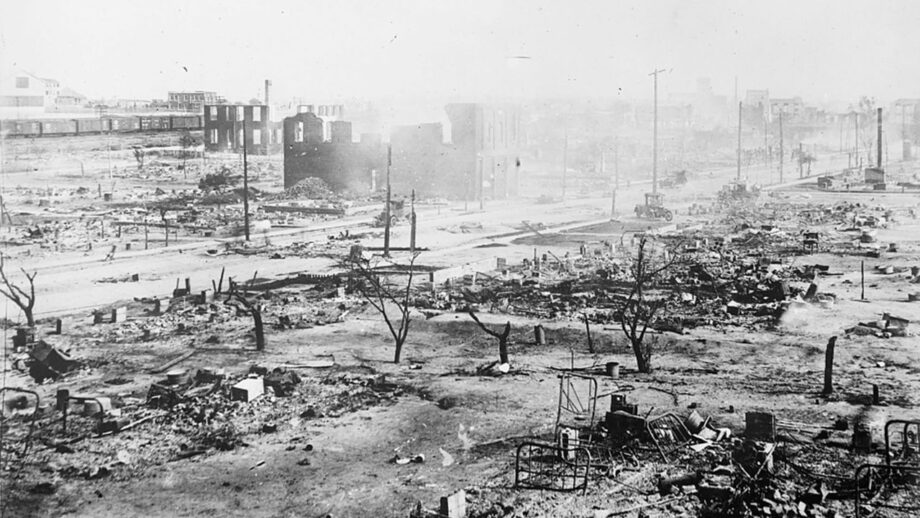The Oklahoma Supreme Court dismissed a lawsuit arguing the remaining survivors of the 1921 Tulsa Race Massacre should be compensated by the city for damages Wednesday, dealing a blow to their ongoing fight for reparations more than 100 years after the attack.
Survivors Hughes Van Ellis, Viola Fletcher and Lessie Benningfield Randle initially filed the lawsuit in 2021. Ellis died last year at the age of 102.
The lawsuit was previously dismissed by an Oklahoma district court judge, who agreed with the city of Tulsa that “simply being connected to a historical event does not provide a person with unlimited rights to seek compensation.”
The plaintiffs appealed the case to the state’s Supreme Court which acknowledged Wednesday that the “grievance with the social and economic inequities created by the Tulsa Race Massacre is legitimate and worthy of merit.”
“However, the law does not permit us to extend the scope of our public nuisance doctrine beyond what the Legislature has authorized to afford Plaintiffs the justice they are seeking,” the court wrote in its decision.
Ellis, Fletcher and Benningfifeld Randle had argued that they had a right for reparations under the city’s public nuisance statute. They also said the city of Tulsa was getting “unjust enrichment” by promoting the site of the massacre as a tourist attraction “without returning any of those benefits to members of the community.”
“The destruction of forty-square blocks of property on the night of May 31, 1921, through murder and arson clearly meets the definition of a public nuisance under Oklahoma law. Faithful application of the law compels the conclusion that Mother Randle and Mother Fletcher have stated a claim for relief,” attorneys for Fletcher and Benningfield Randle said in a statement after the decision.
“They are entitled to a trial. Yet the Court held that Mother Randle and Mother Fletcher have asked the Court to decide a ‘political’ question that is beyond the purview of the Court,” the attorneys added.
In 1921, the Greenwood neighborhood was a thriving Black-owned business district in Tulsa, Oklahoma. On May 31, 1921, a White mob laid waste to about 35 blocks of the neighborhood within 16 hours, arresting thousands of Black residents, while robbing, beating and killing others, CNN previously reported.
Insurance companies later denied many claims filed by Black business owners over what today would be worth tens of millions of dollars in property damage, including the destruction of two Black hospitals and 1,256 residences, according to the Greenwood Cultural Center, CNN previously reported.
Attorneys for Fletcher and Benningfield Randle said in their statement that they plan to file a petition for rehearing with the Oklahoma Supreme Court, asking the Court to reconsider its decision. They also called on the US Department of Justice to open an investigation into the massacre under the Emmett Till Unsolved Civil Rights Crime Act of 2007.
Viola Ford Fletcher, 109, previously told CNN if she and her family had not been forced to leave their home and community with essentially just the clothes on their backs, “I would’ve gotten an education, to where I could get a better job, especially being a nurse.”
Fletcher told CNN she “never got over” what she experienced that day and still remembers “people getting killed, houses, property, schools, churches, and stores getting destroyed with fire.”
“It just stays with me, you know, just the fear. I have lived in Tulsa since, but I don’t sleep all night living there.”
Lessie Benningfield Randle’s family previously urged the court to “honor” the survivors “while they are still with us.” They noted that Ellis, also known as Uncle Redd, “waged this (legal) battle until his final breath.”
“We must not allow the stories of the LAST TWO SURVIVORS to be buried alongside them. Justice for Mother Randle and Mother Fletcher is overdue!”
In a previous legal brief filed in the case, Attorney Damario Solomon-Simmons argued the Oklahoma Supreme Court could be the survivors remaining opportunity to receive justice after all these years.
“There is no going to the United States Supreme Court. There is no going to the federal court system. This is it,” he said.
SOURCE: amp.cnn.com




